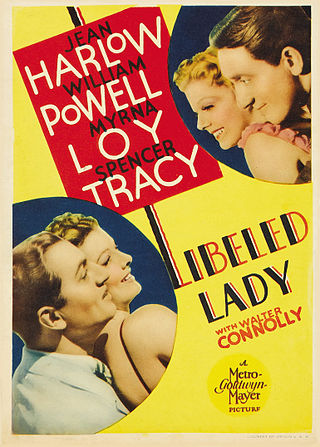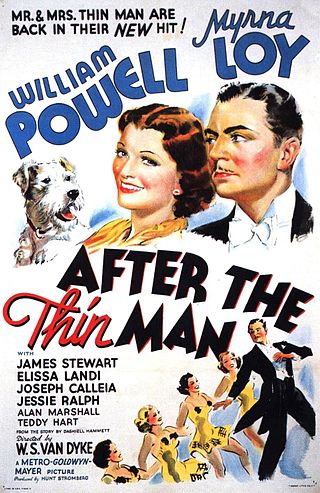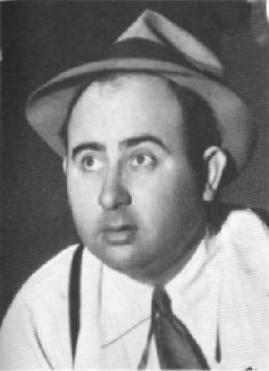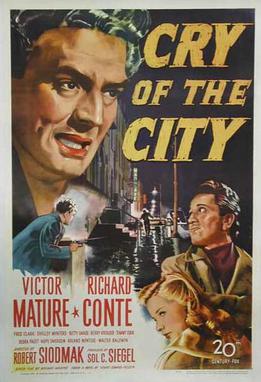
Spencer Bonaventure Tracy was an American actor. He was known for his natural performing style and versatility. One of the major stars of Hollywood's Golden Age, Tracy was the first actor to win two consecutive Academy Awards for Best Actor, from nine nominations. During his career, he appeared in 75 films and developed a reputation among his peers as one of the screen's greatest actors. In 1999, the American Film Institute ranked Tracy as the 9th greatest male star of Classic Hollywood Cinema.

Libeled Lady is a 1936 American screwball comedy film directed by Jack Conway and starring Jean Harlow, William Powell, Myrna Loy, and Spencer Tracy. The screenplay was written by Maurine Dallas Watkins, Howard Emmett Rogers, and George Oppenheimer, from a story by Wallace Sullivan. This was the fifth of fourteen films in which Powell and Loy were teamed, inspired by their success in the Thin Man series.

After the Thin Man is a 1936 American murder mystery comedy film directed by W. S. Van Dyke and starring William Powell, Myrna Loy and James Stewart. A sequel to the 1934 feature The Thin Man, the film presents Powell and Loy as Dashiell Hammett's characters Nick and Nora Charles. The film also features Elissa Landi, Joseph Calleia, Jessie Ralph, Alan Marshal and Penny Singleton.

Stanislaus Pascal Franchot Tone was an American actor, producer, and director of stage, film and television. He was a leading man in the 1930s and early 1940s, and at the height of his career was known for his gentlemanly sophisticate roles, with supporting roles by the 1950s. His acting crossed many genres including pre-Code romantic leads to noir layered roles and World War I films. He appeared as a guest star in episodes of several golden age television series, including The Twilight Zone and The Alfred Hitchcock Hour while continuing to act and produce in the theater and movies throughout the 1960s.

Woodbridge Strong Van Dyke II was an American film director who made several successful early sound films, including Tarzan the Ape Man in 1932, The Thin Man in 1934, San Francisco in 1936, and six popular musicals with Nelson Eddy and Jeanette MacDonald. He received two Academy Award nominations for Best Director for The Thin Man and San Francisco, and directed four actors to Oscar nominations: William Powell, Spencer Tracy, Norma Shearer, and Robert Morley. Known as a reliable craftsman who made his films on schedule and under budget, he earned the name "One Take Woody" for his quick and efficient style of filming.

Dean Jagger was an American film, stage, and television actor who won the Academy Award for Best Supporting Actor for his role in Henry King's Twelve O'Clock High (1949).

Richard Thorpe was an American film director best known for his long career at Metro-Goldwyn-Mayer.

The Big Combo is a 1955 American crime film noir directed by Joseph H. Lewis, written by Philip Yordan and photographed by cinematographer John Alton, with music by David Raksin. The film stars Cornel Wilde, Richard Conte and Brian Donlevy, as well as Jean Wallace, who was Wilde's wife at the time. The supporting cast features Lee Van Cleef, Earl Holliman and the final screen appearance of actress Helen Walker. The Big Combo received positive reviews from critics.

Norman Rae Taurog was an American film director and screenwriter. From 1920 to 1968, Taurog directed 180 films. At the age of 32, he received the Academy Award for Best Director for Skippy (1931), becoming the youngest person to win the award for eight and a half decades until Damien Chazelle won for La La Land in 2017. He was later nominated for Best Director for the film Boys Town (1938). He directed some of the best-known actors of the twentieth century, including his nephew Jackie Cooper, Spencer Tracy, Mickey Rooney, Judy Garland, Deanna Durbin, Fred Astaire, Gene Kelly, Deborah Kerr, Peter Lawford, Dean Martin, Jerry Lewis, Elvis Presley and Vincent Price. Taurog directed six Martin and Lewis films, and nine Elvis Presley films, more than any other director.

The Killers is a 1946 American film noir directed by Robert Siodmak and starring Burt Lancaster in his film debut, along with Ava Gardner, Edmond O'Brien and Sam Levene. Based in part on the 1927 short story of the same name by Ernest Hemingway, it focuses on an insurance detective's investigation into the execution by two professional killers of a former boxer who was unresistant to his own murder. The screenplay was written by Anthony Veiller, with uncredited contributions by John Huston and Richard Brooks.

Sam Levene was an American Broadway, films, radio, and television actor and director. In a career spanning over five decades, he appeared in over 50 comedy and drama theatrical stage productions. He also acted in over 50 films across the United States and abroad.

Cry of the City is a 1948 American film noir starring Victor Mature, Richard Conte, and Shelley Winters. Directed by Robert Siodmak, it is based on the novel by Henry Edward Helseth, The Chair for Martin Rome. The screenwriter Ben Hecht worked on the film's script, but is not credited. The film was partly shot on location in New York City.

Brute Force is a 1947 American crime film noir directed by Jules Dassin, from a screenplay by Richard Brooks with cinematography by William H. Daniels. It stars Burt Lancaster, Hume Cronyn, Charles Bickford and Yvonne De Carlo.

That's Entertainment, Part II is a 1976 American compilation film released by Metro-Goldwyn-Mayer and a sequel to That's Entertainment! (1974). Like the previous film, That's Entertainment, Part II was a retrospective of famous films released by MGM from the 1930s to the 1950s. Some posters for the film use Part 2 rather than Part II in the title.
Without Honor is a 1949 American film noir directed by Irving Pichel and starring Bruce Bennett, Laraine Day, Dane Clark, Agnes Moorehead, and Franchot Tone.

Hugh Ryan "Jack" Conway was an American film director and film producer, as well as an actor of many films in the first half of the 20th century.

Love on the Run is a 1936 American romantic comedy film, directed by W.S. Van Dyke, produced by Joseph L. Mankiewicz, and starring Joan Crawford, Clark Gable, Franchot Tone and Reginald Owen in a story about rival newspaper correspondents assigned to cover the marriage of a socialite. The screenplay by John Lee Mahin, Manuel Seff and Gladys Hurlbut was based on a story by Alan Green and Julian Brodie. Love on the Run is the seventh of eight cinematic collaborations between Crawford and Gable. At the time of its release, Love on the Run was called "a lot of happy nonsense" by critics, but was a huge financial success, nonetheless.

Billy Rose's Jumbo is a 1962 American musical film released by Metro-Goldwyn-Mayer and starring Doris Day, Stephen Boyd, Jimmy Durante, and Martha Raye. An adaptation of the stage musical Jumbo produced by Billy Rose, the film was directed by Charles Walters, written by Sidney Sheldon, and featured Busby Berkeley's choreography. It was nominated for an Academy Award for the adaptation of its Rodgers and Hart score.

Jigsaw is a 1949 American film noir crime drama directed by Fletcher Markle starring Franchot Tone, Jean Wallace and Marc Lawrence. The feature was produced by the Danziger Brothers, Edward J. Danziger and Harry Lee Danziger from a screenplay by Vincent McConnor and Fletcher Markle, which was based on a story by John Roeburt.

Man-Proof is a 1938 American romantic comedy film directed by Richard Thorpe. The film is based on the 1937 novel The Four Marys written by Fannie Heaslip Lea.



















